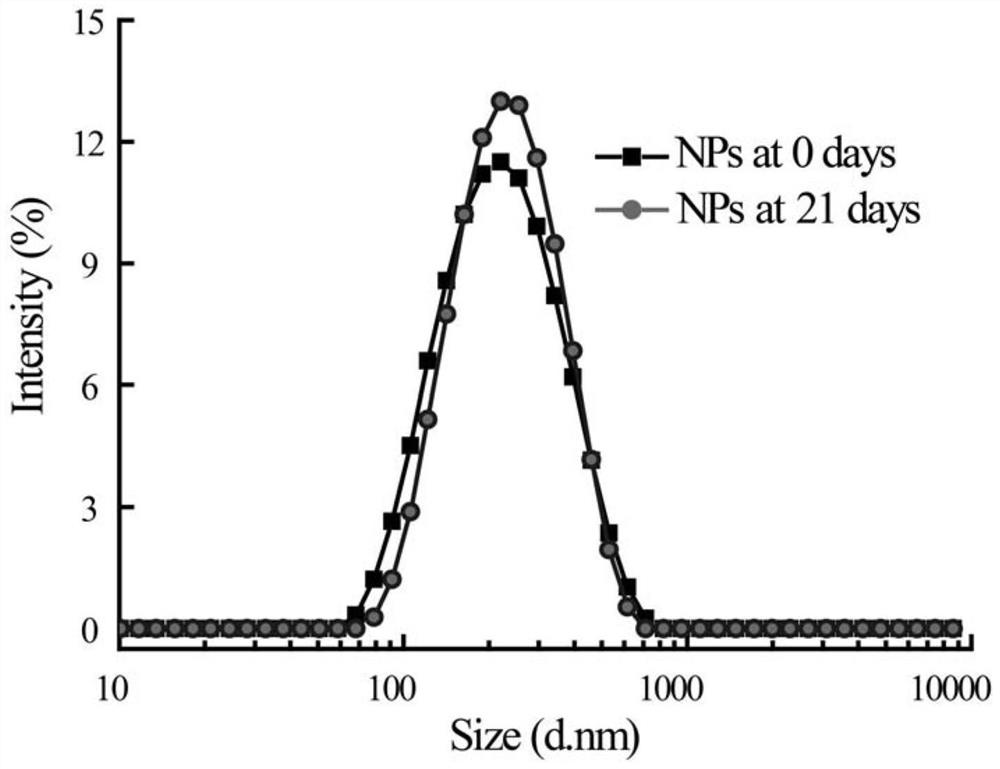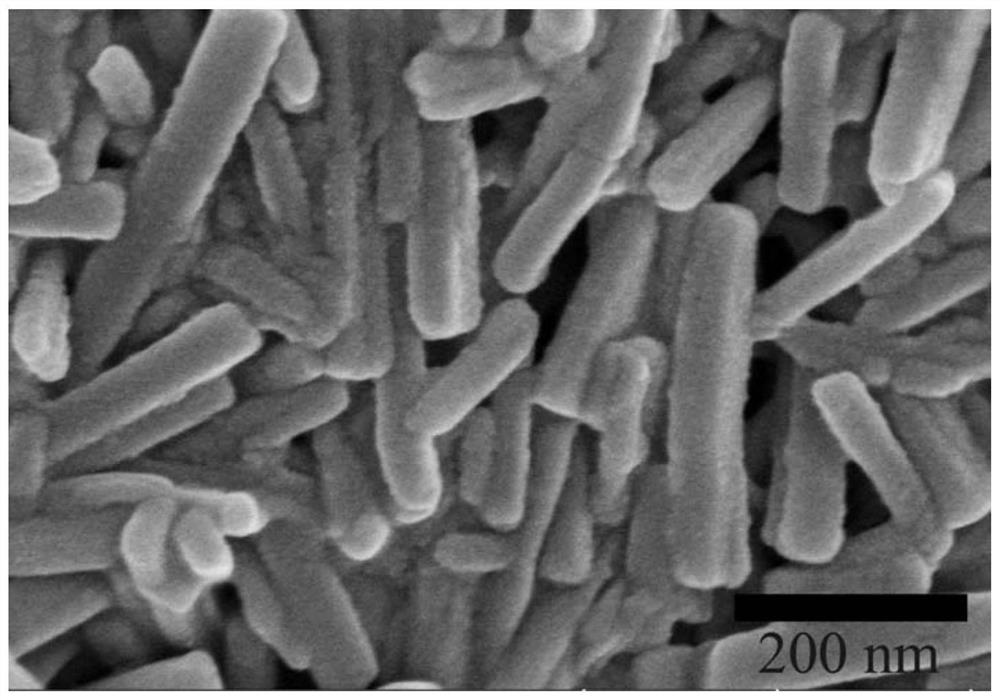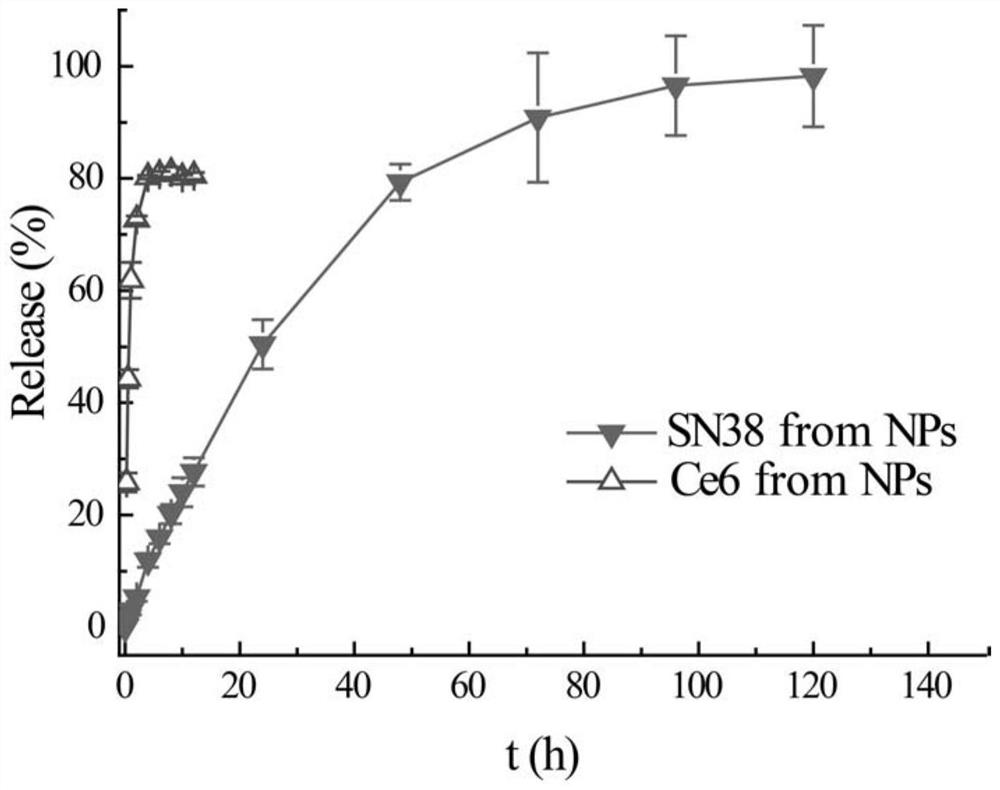A kind of high drug-loaded photo-chemotherapy bifunctional nanoparticle and preparation method thereof
A high drug loading, nanoparticle technology, applied in the field of medicine, can solve the problems of easy removal of molecular state, limited practical application, lack of targeting, etc., to improve bioavailability, achieve synergistic anti-tumor, and simple preparation method easy effect
- Summary
- Abstract
- Description
- Claims
- Application Information
AI Technical Summary
Problems solved by technology
Method used
Image
Examples
Embodiment 1
[0045]Example 1 Preparation of 7-ethyl-10-hydroxycamptothecin (SN38) / chlorin e6 (Ce6) high drug-loading bifunctional nanoparticles (SN38 / Ce6 NPs): accurately weigh 7.6 mg of SN38 powder and 3.8mg Ce6 were dissolved in 0.5mL DMF, dissolved by ultrasonic to form an organic phase; the above organic phase was added dropwise to 15mL deionized water under 250W ultrasonic conditions, and the temperature was controlled below 20°C, and the ultrasonic wave was continued for 10min; accurately weighed. Take 11.4mg DSPE-PEG 2000 The powder was dissolved in 0.5mL DMF, dissolved by ultrasonic to form an organic phase, and added dropwise to the above aqueous phase under 250W ultrasonic conditions, the temperature was controlled below 20°C, and the ultrasonic wave was continued for 10min; the organic solvent was removed by dialysis; 3 times for 1.5 min each time to obtain SN38 / Ce6 NPs. The particle size was measured by dynamic light scattering (DLS). After being placed at 4°C for 21 days, th...
Embodiment 2
[0047] Embodiment 2 adopts scanning electron microscope (Scanning electron microscopy, SEM) to observe the morphology of SN38 / Ce6 NPs: after the SN38 / Ce6 NPs obtained in Example 1 is freeze-dried without adding a freeze-drying protective agent, the freeze-dried powder is fixed on copper with conductive glue The column was sprayed with gold for 240s under the condition of vacuum and 30mA current. observed under a scanning electron microscope.
[0048] The SN38 / Ce6 NPs observed in Example 2 showed a regular rod-like structure ( figure 2 ), the length and diameter of the nanorods are relatively consistent, with an average length of 300 nm and a diameter of about 20 nm. Since the particles in the solution are assumed to be spherical during DLS measurement, the measured particle size is the equivalent volume particle size. So SEM and DLS results will be slightly biased.
Embodiment 3
[0049] Example 3 Determination of the in vitro release curve of double drug-loaded and carrier-free nanoparticles by dynamic membrane dialysis: three batches of SN38 / Ce6 NPs were prepared according to Example 1, and diluted with deionized water to a concentration of SN38 of 25 μg / mL and a concentration of Ce6 of 12.5 μg / mL, in vitro drug release test. Precisely draw 2 mL of the drug-containing solution, put it into a dialysis bag (MWCO=8000~14000) soaked in distilled water, tie the bag tightly, add 100 mL of 0.01M PBS (containing 1% SDS), and shake at a constant temperature in a water bath at 37°C released in the device (100 rpm). 5mL was sampled at preset time points (0.0833, 0.25, 0.5, 1, 2, 4, 6, 8, 10, 12, 24, 48, 72, 96, 120h), and an isothermal and equal volume of release medium was added at the same time. According to the measured drug concentration, the cumulative drug release percentage was calculated, and the drug release curve was drawn.
[0050] The in vitro rel...
PUM
| Property | Measurement | Unit |
|---|---|---|
| particle size | aaaaa | aaaaa |
| diameter | aaaaa | aaaaa |
| particle diameter | aaaaa | aaaaa |
Abstract
Description
Claims
Application Information
 Login to View More
Login to View More - R&D
- Intellectual Property
- Life Sciences
- Materials
- Tech Scout
- Unparalleled Data Quality
- Higher Quality Content
- 60% Fewer Hallucinations
Browse by: Latest US Patents, China's latest patents, Technical Efficacy Thesaurus, Application Domain, Technology Topic, Popular Technical Reports.
© 2025 PatSnap. All rights reserved.Legal|Privacy policy|Modern Slavery Act Transparency Statement|Sitemap|About US| Contact US: help@patsnap.com



